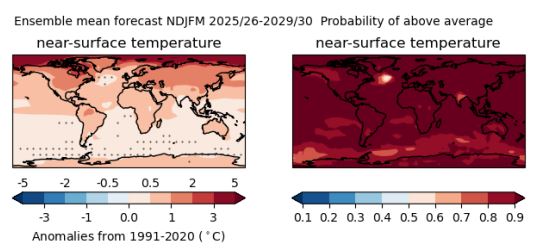Global warming, the UN alarm: « +1.5 degrees by 2029 »

The latest report of the world meteorological organization worsens the estimates of the previous year: « 70% probability that the average temperatures up to 2030 are 1.5 ° C higher than the pre-industrial period »
2024 was the hottest ever recorded, but it is highly probable (with an estimated certainty at 80%) that in the next five years the record will be exceeded. This is what provides for The latest annual report of the world meteorological organization (OMM)United Nations Agency that hypothesizes the possible scenario in the five-year period 2025-2029 under the effect of climate change.
The data show that the temperatures levels will remain high. There is even 86% probability that in at least one of the next five years there will be an increase greater than 1.5 ° C compared to the average of 1850-1900.
« We have just lived the hottest ten years ever recorded-comments Ko Barrett, vice-secretary general of the OMM-. Unfortunately, this report does not provide any sign of respite in the coming years e This means that there will be a growing negative impact on our economies, our daily life, our ecosystems and on our planet».
In the period 2025-2029, temperatures from 1.2 to 1.9 degrees centigrade are expected to higher than the pre-industrial period. With a 70%probability that the average five -year heating exceeds 1.5 degrees, a significantly worse estimate compared to that of last year’s ratio (which gave a probability to 47%) and two years ago (32%).
Considering instead the ten -year average, the heating should remain below 1.5 ° C. However, for the first time, the OMM provides for the statistical possibility that by 2030 the annual temperature may even be greater than 2 ° C compared to the period 1850-1900. A scenario given to 1% and only in case of convergence of multiple factors, but it is symptomatic that so far it was considered an impossible possibility at such a short deadline. « It is shocking that the 2 ° C are plausible – In fact, said Adam Scafe of the Met Office, the UK meteorological agency that made the major contribution to the compilation of the relationship -. Although it emerged that it is only 1% in the next five years, the probability will increase with climatic warming ».
The impacts of the change will be different in the various regions of the planet. Arctic winters are expected to heat up 3.5 times faster than the global averagein part due to the dissolution of marine ice: in this way the snow falls directly into the ocean instead of forming a superficial layer that reflects the sun’s rays in space. The Amazon rainforest will suffer greater drought, while Southern Asia, Sahel and northern Europe, including the United Kingdom, will see more rain.








